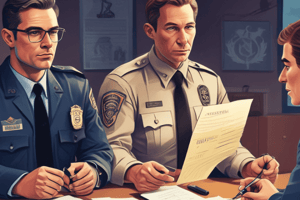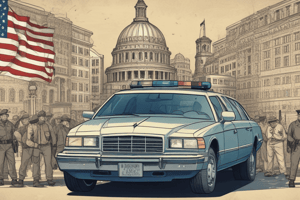Podcast
Questions and Answers
Which of the following is NOT one of the three elements of communication according to the text?
Which of the following is NOT one of the three elements of communication according to the text?
- Tone of voice
- Words
- Body language
- Facial expressions (correct)
What are the seven C's of verbal communication?
What are the seven C's of verbal communication?
- Civility, clarity, complexity, completeness, creativity, concreteness, and caution
- Conciseness, clarity, correctness, consideration, concreteness, creativity, and caution
- Correctness, clarity, conciseness, completeness, consideration, concreteness, and courtesy (correct)
- Clarity, correctness, completeness, consideration, concreteness, creativity, and courtesy
Flashcards are hidden until you start studying
Study Notes
Effective Communications and Requirements & Collection Management in Law Enforcement
- Communication is essential in managing people and situations in law enforcement.
- An officer's attitude and behavior play a crucial role in resolving encounters with the public.
- Communication is conveyed through words (7%), body language (55%), and voice/vocal nuance (38%).
- Active listening is a critical element of effective communication, which involves understanding, responding, remembering, and paraphrasing what is being said.
- Verbal communication is not just about what is being said but also how it is said, including accuracy, brevity, clarity, language, pace, pitch, modulation, tone, and nuance.
- The seven C's of verbal communication are correctness, clarity, conciseness, completeness, consideration, concreteness, and courtesy.
- The Ask-Tell-Make model is a way to communicate directives effectively.
- Requirements and Collection Management (RCM) supports collection of information to satisfy enduring requirements and day-to-day border-related activities and operations.
- The RCM process involves identifying a threat, reviewing the Information Collection Guide, and reporting into the National Intelligence System.
- Communication Notebook is used to document critical information, including CCCA (Clear, Concise, Complete, and Accurate) and ELBOWS (No Erasures, Leaves torn out, Blank lines, Overwriting, Writing between the lines, or Separate Text).
- Officers must make contemporaneous notes of events, including dates, times, locations, names, document numbers, vessel details, unique identifiers, and hours of duty.
- Legislation Foundation 4 covers the patrolling powers, securing waterfront areas, and restricted areas for unauthorized entry, use of cameras and sound recordings, and questioning persons found in restricted areas. ABF officers must show their ID or identify themselves when conducting their duties.
Studying That Suits You
Use AI to generate personalized quizzes and flashcards to suit your learning preferences.




